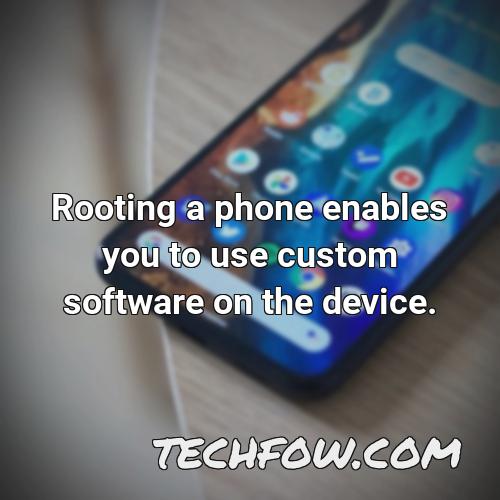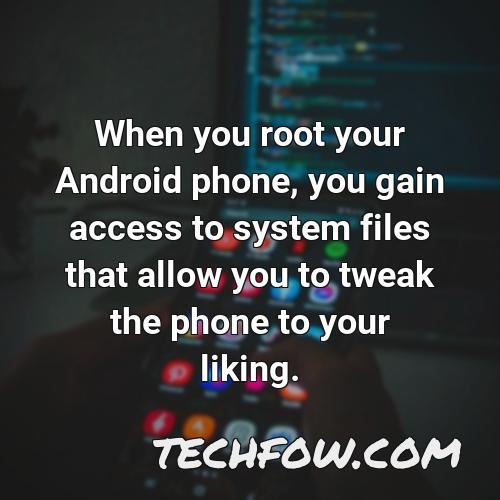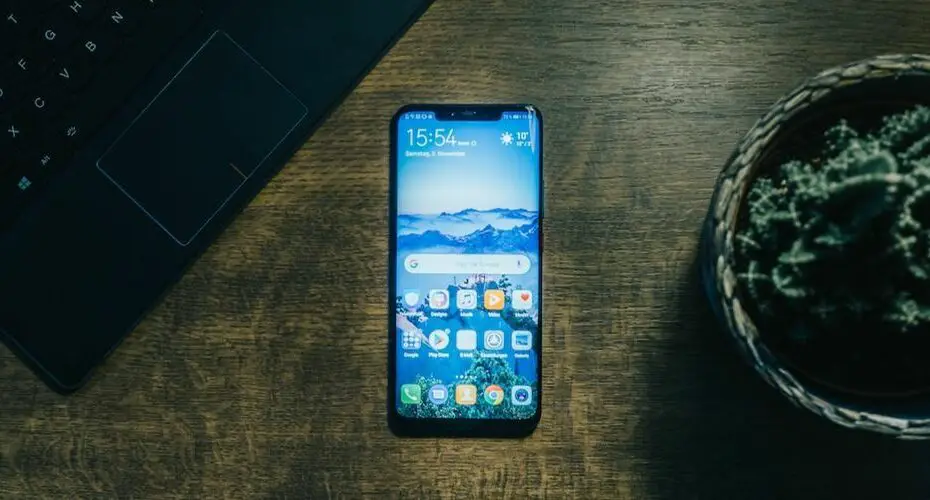Rooting an Android device allows you to gain administrative access to the device, which can be useful for installing custom software, tweaking settings, or performing other tasks that are not available through the normal Android user interface. Rooting an Android device also allows you to install custom kernels and ROMs, which can give you additional features or performance improvements.
First things first
Rooting an Android device is the process of gaining complete control over it and access to the system files. This can be helpful if you want to customise or tinker with your device, or if you need to fix a problem. Rooting can also give you access to features and applications not available in the official Android software.

Is Rooting Safe for Android
Rooting a phone enables you to use custom software on the device. This custom software can be used to make the phone do things that it wouldn’t ordinarily be able to do, like gain access to sensitive information or disable security features. Rooting is a security risk because it can expose your phone to viruses and other malware.

Is Rooting Android Necessary
Rooting is the process of enabling an Android phone or tablet to access files and settings not normally accessible to the user, such as those in the system partition. Rooting can be done for various reasons, including to remove restrictions on the use of custom applications or to enable additional features not available through the stock Android user interface.
There are two main methods of rooting Android devices: through a custom recovery such as ClockworkMod Recovery or Philz Recovery or by direct flashing of a root firmware image. Both methods require that the user has unlocked the bootloader of their device, which varies depending on the manufacturer of the device.
While root access is not always necessary, it can be beneficial for users who want to use alternate applications or tweak their device’s performance. Rooting can also be useful for users who have lost their Google account or who want to use a third-party Google application such as Goggle Maps.

Why Should I Root My Android
Rooting your phone enables you to access extra features and security. For example, you can use a rooted phone to save battery life by putting certain apps in hibernation mode. Rooting also gives you access to features not available on a non-rooted phone, such as the ability to root your phone and install custom ROMs.

Is Rooting a Phone a Good Idea
If you have a rooted Android device, you are more vulnerable to malicious attacks. Rooting your device gives malicious apps access to your device’s operating system and can allow them to do things like take over your phone or even spy on you.
The security model of Android is also compromised when you have root. Some malware specifically looks for root access, which allows it to really run amok. For this reason, most Android phones are not designed to be rooted. That’s why most people who root their devices do it because they want to customize their device or they need to fix a problem. But if you want to keep your device safe and secure, you should probably not root your device.

What Happens if Your Device Is Rooted
If you have a rooted phone, you can do things like change the settings on the phone to do things you wouldn’t be able to do without root access, like accessing the files on the phone that are normally hidden. Rooting also allows you to install apps that the phone manufacturer wouldn’t allow you to install.

Why People Root Their Phone
Some people root their phone to install custom ROMs and alternative software kernels, which allows them to run an entirely new system on their device without getting a new handset. For example, you can update your Android phone to the latest version of Android even if your manufacturer no longer allows you to do so.

What Happens When You Root Your Android
When you root your Android phone, you gain access to system files that allow you to tweak the phone to your liking. This can include changing the look and feel of the user interface, adding new features to apps, or even deleting unwanted programs. There are a few things to keep in mind when rooting your Android phone, however.
First, be sure to back up your phone’s data before proceeding. Rooting can erase your phone’s contents, including any data you may have saved.
Second, be aware that rooting your phone can void its warranty. Make sure you understand the risks before proceeding.
And finally, be sure to understand the potential consequences of rooting your phone before doing so. Rooting can potentially damage your phone, erase your data, or even grant access to malicious programs. If you’re not sure whether or not rooting is right for you, consult a professional.

How Do I Keep My Android From Rooting
To prevent your Android device from being rooted, you will need to delete some files and disable some features. First, access your device’s main drive and look for system. Delete busybox and su. By the way, these might not be there.
Next, go back to the system folder and select xbin. Go back to the system folder and select app. Delete superuser.
Restart the device, and it will all be done.

How Do I Root My Phone Without a Computer
There are several ways to root your Android phone without a computer. One way is to use an app called Baidu Root. Baidu is a popular app used to root Android devices without the need of a PC. Another way is to use an app called KingRoot. KingoRoot is another app that can be used to root Android devices.
How Do I Access My Main Drive Device
If you want to access your main storage device, on your Android phone, you can go to Settings > System > Storage > Device storage. Here, you can preview what data is using your internal storage and how much free storage you have.
Summary
If you’re looking to increase your Android device’s capabilities or gain administrative access, rooting is a great way to do so. Rooting allows you to install custom kernels and ROMs, which can give you access to features or performance improvements that are not available through the normal Android user interface.

